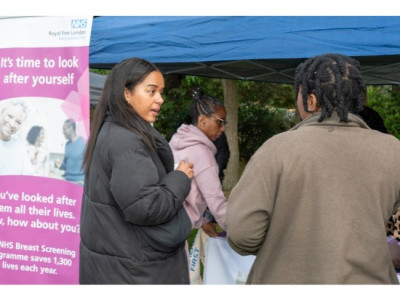
A new scheme from the Royal Free London (RFL) is helping women in minority communities access vital breast screening services.
Women aged 50 to 71 are offered a breast screening appointment once every three years – however uptake rates for women from ethnic or other minority communities are typically much lower than for white women.
In order to address the imbalance, the RFL’s health promotion team for breast screening services have been exploring different ways to reach women who may otherwise be unaware of the importance of being screened, including training community champions to work within the Somali community and myth-busting with the Gypsy, Roma and Traveller communities.
Claire Mabena, lead clinical nurse specialist for North London and Central and East London Breast screening service (NLBSS and CELBSS), run by the RFL, said the key was understanding the barriers that prevent women attending appointments.
She said: “It’s not enough to get things translated and share on social media. Some women are unable to read at all so it’s all about finding people in their communities who will engage with them face to face or via their social media platforms to share our message.
“We train people in the local community who then can promote the benefits of attending breast screening and breast awareness, so we leave behind a legacy of community champions. We’re proud of the progress we’ve made to deliver equitable healthcare.”
Within the Gypsy, Roma and Traveller community the team has worked hard to dispel myths circulating about perceived ‘dangerous’ levels of radiation exposure delivered in chest x-rays - in reality, the x-ray delivers less radiation then a person would experience on a transatlantic flight.
The team have also engaged with male leaders who are influential within the Muslim community, such as imams, and are targeting GPs where screening uptake of their patients is currently low. The team have held health and wellbeing events which have proved extremely popular.
“Promoting breast screening isn’t seen as a priority for some GPs but they are open to being supported and this is a good way for us to share the screening message with their patients,” Claire said. “To date we have held 27 GP events and engaged 546 GPs.”
Claire added that it isn’t just cultural barriers which prevent women accessing this life-saving service.
She said: “Sometimes it is as stark as having to choose between putting food on the table or paying for transport to their screening appointment. For others it might be about being unable to afford to take time off work. It is really important that we find out what the barriers are to uptake and address them. For example, our screening centres are offering longer hours during the week and more weekend appointments for those who find getting away from work difficult.”
The team has also enjoyed success in helping women with learning disabilities access the screening service. You can read more about this here.
Reducing health inequalities is a key part of our clinical strategy which you can learn more about here.
 Translate
Translate